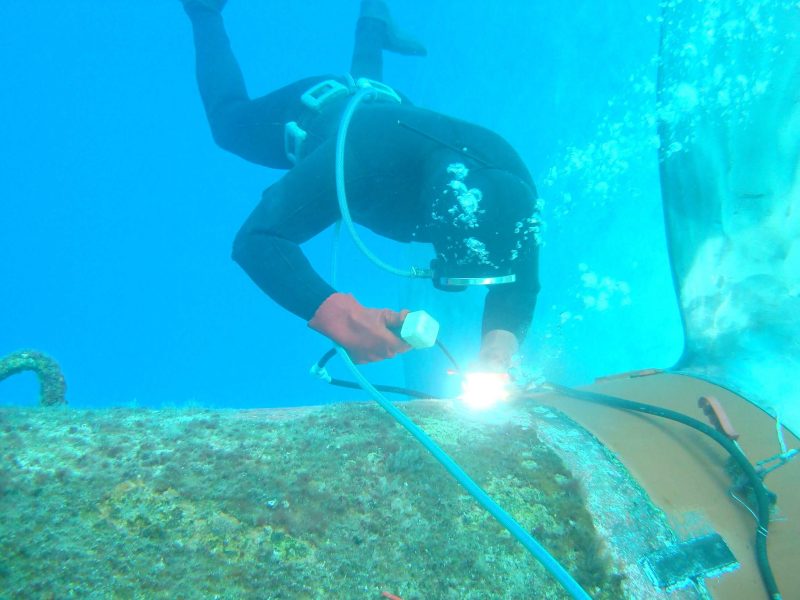Ever wondered how much underwater welders make in a year? Well, buckle up because we’re about to dive deep into the world of underwater welding salaries! If you’ve got a knack for working in challenging environments and love the idea of combining welding skills with scuba diving, this could be the career for you. Underwater welding salary per year isn’t just about the money—it’s about adventure, skill, and a whole lot of guts.
Underwater welding might sound like something out of a sci-fi movie, but it’s a real and highly specialized profession. These welders don’t just work on land—they take their craft beneath the waves to repair pipelines, offshore rigs, and ships. It’s not for the faint of heart, but the rewards are worth it. And let’s face it, who wouldn’t want to earn a decent paycheck while exploring the ocean depths?
As we explore the ins and outs of underwater welding salaries, you’ll discover what factors influence pay, the skills required, and why this career is more than just a nine-to-five job. So, grab your diving gear and let’s get started!
Read also:Rhea Ripley Pornographic Allegations Unveiling The Truth Behind The Wrestlers Controversy
Table of Contents
- Introduction to Underwater Welding
- Underwater Welding Salary Overview
- Factors Affecting Underwater Welding Salary
- Training and Certification Requirements
- Job Roles and Responsibilities
- Career Progression in Underwater Welding
- Risks and Safety Measures
- Demand and Opportunities for Underwater Welders
- Long-Term Potential and Growth
- Conclusion: Is Underwater Welding Right for You?
Introduction to Underwater Welding
Underwater welding is one of the most unique and demanding professions out there. It combines two highly skilled trades—welding and commercial diving—to create a career that’s both challenging and rewarding. These professionals work in environments that most people only dream of exploring, but it’s not all fun and games. The job requires precision, technical expertise, and the ability to stay calm under pressure.
What Exactly is Underwater Welding?
Underwater welding involves repairing and maintaining structures submerged in water, such as oil rigs, pipelines, and ships. Welders use specialized equipment to perform their tasks in conditions that can be unpredictable and dangerous. The process can be done in two ways: wet welding, where the welder works directly underwater, and dry welding, where a hyperbaric chamber is used to create a dry environment.
It’s not just about welding though. Underwater welders also perform inspections, maintenance, and repairs. They work closely with engineers and other professionals to ensure structures remain safe and functional.
Underwater Welding Salary Overview
So, how much does an underwater welder make? The short answer is—it depends. The underwater welding salary per year can vary significantly based on factors like experience, location, and type of employer. On average, underwater welders can earn anywhere from $50,000 to $100,000 annually, with some highly experienced professionals earning even more.
Breaking Down the Numbers
- Entry-level underwater welders: $40,000 – $60,000 per year
- Mid-career underwater welders: $60,000 – $90,000 per year
- Senior underwater welders: $90,000 – $150,000 per year
Keep in mind, these numbers can fluctuate depending on the project and the level of risk involved. Some welders earn additional bonuses for working in extreme conditions or on high-priority projects.
Read also:Squishmallows Names The Ultimate Guide To Finding Your Favorite Fluffy Companion
Factors Affecting Underwater Welding Salary
While the average underwater welding salary per year sounds impressive, there are several factors that can impact how much you earn. Let’s take a closer look at what influences your paycheck.
Experience and Skill Level
As with most professions, experience plays a big role in determining salary. Entry-level welders typically earn less than those with years of experience. Additionally, having advanced skills in specific welding techniques can increase your earning potential.
Location and Employer
Where you work can also affect your salary. Underwater welders in regions with a high demand for offshore drilling, like the Gulf of Mexico or the North Sea, tend to earn more. Similarly, working for large multinational companies often comes with better pay and benefits.
Type of Welding
Wet welding generally pays less than dry welding because it’s considered less technical and safer. However, wet welding offers more opportunities for work, especially in remote locations. Dry welding, on the other hand, requires specialized equipment and training, which can command higher salaries.
Training and Certification Requirements
Before you can start earning that sweet underwater welding salary per year, you’ll need the right training and certifications. This isn’t a job you can just jump into without proper preparation.
Basic Welding Skills
First things first, you’ll need to master traditional welding techniques. This usually involves completing a welding program at a vocational school or community college. Once you’ve got the basics down, it’s time to take your skills underwater.
Commercial Diving Certification
To become an underwater welder, you’ll also need to become a certified commercial diver. This involves learning how to dive safely and efficiently, as well as understanding the physics of working underwater. There are several organizations that offer commercial diving certifications, such as the Association of Diving Contractors International (ADCI).
Job Roles and Responsibilities
Underwater welders wear many hats on the job. Here’s a breakdown of what you can expect to do on a typical day.
Repair and Maintenance
A large part of the job involves repairing and maintaining underwater structures. This could mean fixing cracks in pipelines, reinforcing oil rig platforms, or repairing ship hulls. Attention to detail is crucial because even the smallest mistake can have serious consequences.
Inspection and Testing
Underwater welders also perform inspections to identify potential issues before they become major problems. They use specialized equipment to test the integrity of structures and ensure they meet safety standards.
Career Progression in Underwater Welding
One of the great things about underwater welding is the potential for career growth. As you gain experience and develop new skills, you can move up the ranks and increase your earning potential.
Specialized Roles
Some welders choose to specialize in specific areas, such as offshore welding or pipeline repair. This can lead to higher-paying opportunities and more job security. Others may transition into management roles, overseeing teams of divers and welders on large-scale projects.
Risks and Safety Measures
Underwater welding isn’t without its risks. Diving deep underwater and working with high-voltage equipment can be hazardous. That’s why safety is a top priority for all underwater welders.
Common Risks
- Drowning
- Decompression sickness
- Electric shock
- Underwater explosions
Despite these risks, the industry has strict safety protocols in place to minimize danger. Welders undergo rigorous training to handle emergencies and are equipped with state-of-the-art safety gear.
Demand and Opportunities for Underwater Welders
The demand for underwater welders is expected to grow as the world continues to rely on offshore energy resources. With the rise of renewable energy projects and the expansion of marine infrastructure, there are plenty of opportunities for skilled welders.
Global Opportunities
Underwater welders can find work all over the world, from the Gulf of Mexico to the South China Sea. International projects often offer higher salaries and the chance to travel, making this a truly global career.
Long-Term Potential and Growth
If you’re considering a career in underwater welding, the long-term potential is promising. With advancements in technology and increasing demand for underwater infrastructure, the field is set to grow in the coming years.
Adapting to Change
As the industry evolves, underwater welders will need to stay up-to-date with the latest tools and techniques. Continuing education and professional development will be key to staying competitive in the job market.
Conclusion: Is Underwater Welding Right for You?
Underwater welding salary per year might seem tempting, but it’s important to consider whether this career is the right fit for you. It’s a challenging and rewarding profession that requires a unique set of skills and a willingness to take risks. If you’re up for the challenge, the rewards—both financial and personal—can be life-changing.
So, what are you waiting for? Dive into the world of underwater welding and see where it takes you. And don’t forget to share your thoughts in the comments below. Are you ready to take the plunge?


